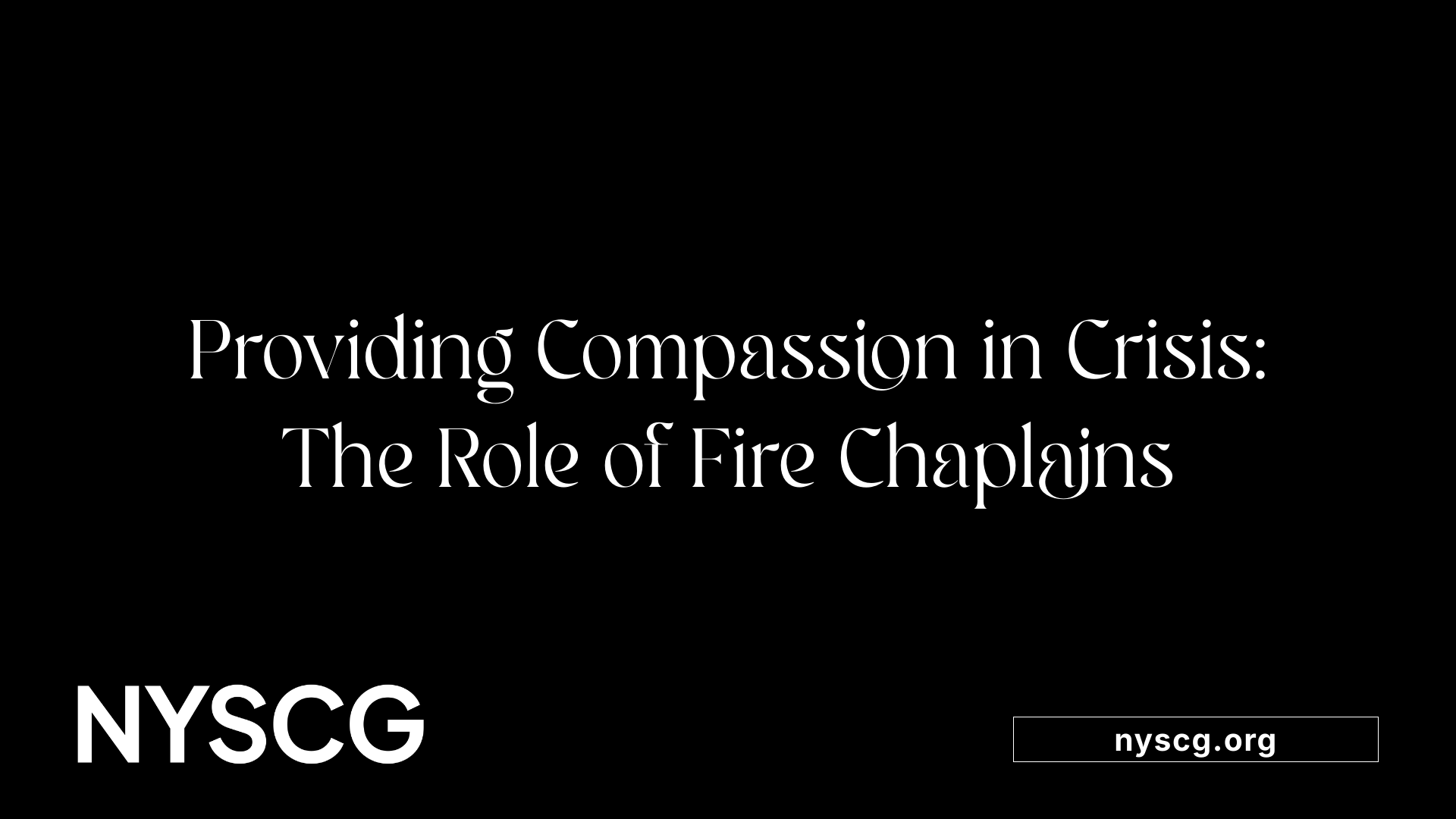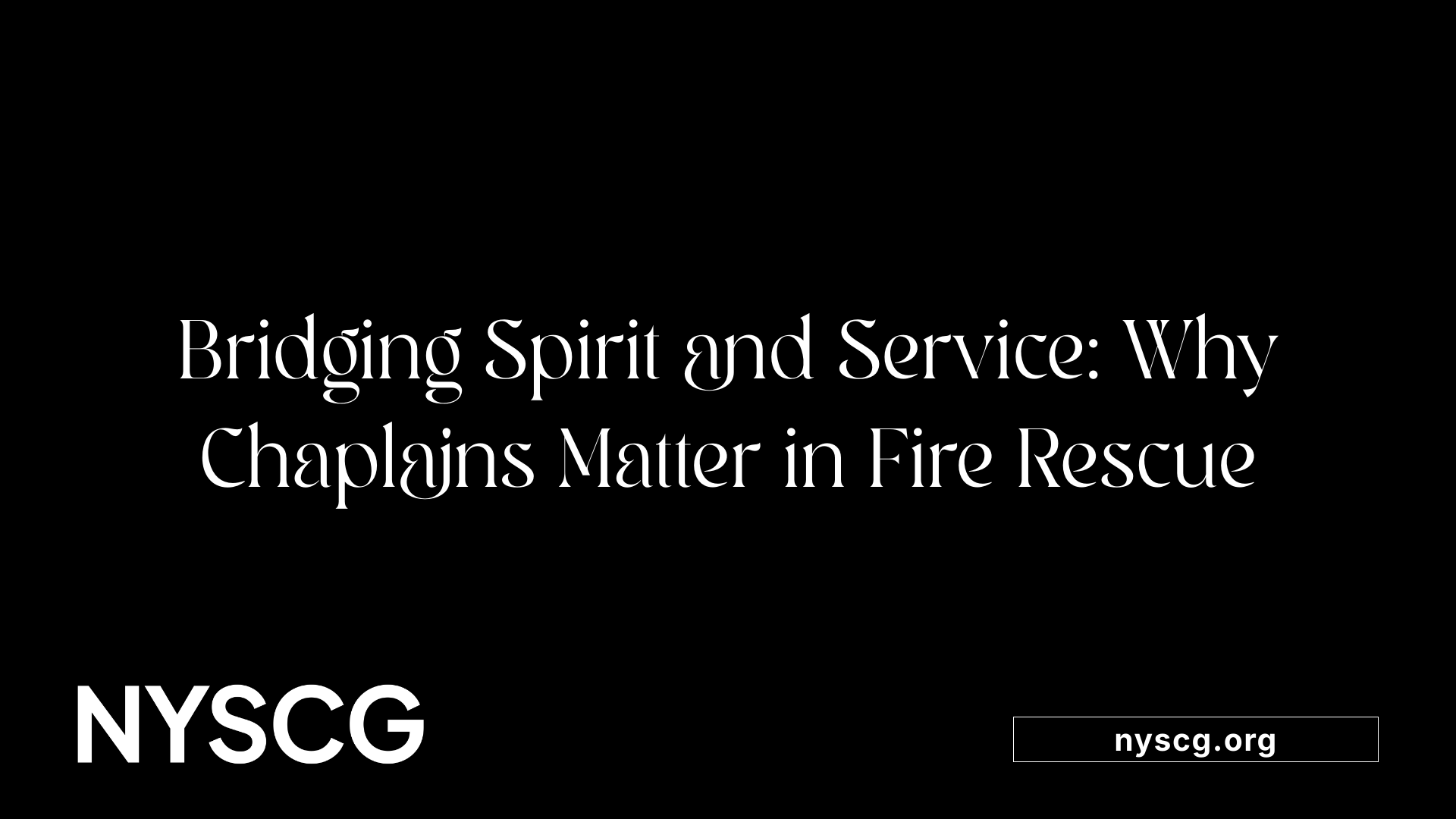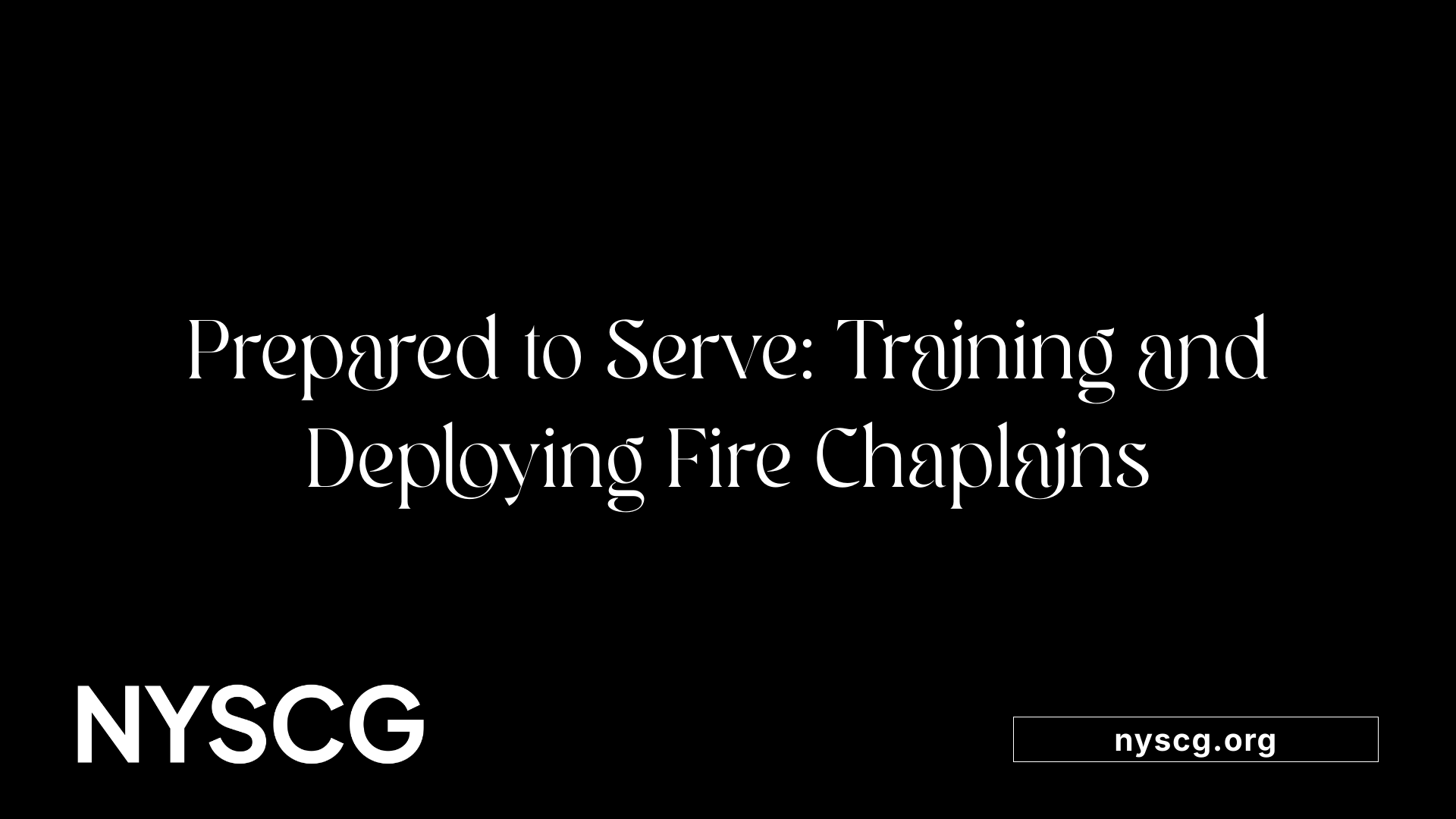Why Fire Departments Are Hiring Chaplains


In recent years, fire departments across the country have increasingly recognized the importance of integrating chaplains into their emergency response teams. These dedicated spiritual and emotional support professionals serve as vital allies for firefighters, victims, and communities alike. This article explores why fire departments are hiring chaplains, the roles they fulfill, and the profound benefits they bring to emergency services and community resilience.

Fire departments recognize the intense physical and emotional toll that emergency responses can take on firefighters, police officers, and their families. To address this, many departments hire chaplains — individuals trained to provide spiritual and emotional support during times of crisis. These chaplains help personnel cope with stress, grief, and trauma, especially after incidents involving injuries or fatalities.
Chaplains are available around the clock, ensuring support is accessible whenever needed, whether during a call, immediately afterward, or in the days following a stressful event. They assist with death notifications, support for victims and their families, and help organize funerals in case of loss. While rooted in religious traditions, most fire chaplains serve in a non-denominational and non-sectarian manner, respecting individuals’ beliefs and providing appropriate religious referrals.
Most chaplains are volunteers, but some are employed full-time or part-time by fire departments or external agencies. They go through specific qualification and endorsement processes, often including interviews, background checks, and endorsement by religious organizations, to ensure they are suitable to serve in these sensitive roles.
The main goal of fire department chaplains is to support emergency responders, victims, and their families during and after crises. Their responsibilities encompass a wide array of services aimed at fostering resilience and offering comfort.
Chaplains are always on call, ready to respond to incidents at any hour, including weekends and holidays. During emergencies, they provide immediate emotional support and spiritual guidance, helping responders manage the stress related to violence, death, or severe trauma.
They assist with
In addition to on-scene support, chaplains offer confidential counseling to firefighters and department members, helping them process personal crises and work-related stress. They also play a crucial role in post-incident trauma management, including Critical Incident Stress Debriefings.
Most fire chaplains are volunteers endorsed by recognized religious organizations, which allows them to tailor spiritual support to the preferences of individuals while maintaining a professional and compassionate approach. Their presence often helps foster trust between the fire service and the community, demonstrating a holistic commitment to emergency response that includes emotional and spiritual care.
Integrating chaplains into emergency services enhances the overall resilience of first responders by addressing their emotional and spiritual needs, which are often overlooked in high-stress situations. Their support not only helps responders recover after traumatic incidents but also promotes healthier coping mechanisms and mental health practices.
Chaplains serve as an approachable resource for personnel and community members, often bridging gaps between different religious and cultural backgrounds. Their efforts contribute to stronger community relations, especially through outreach and support during crises.
Fire department chaplains play an essential role in building a resilient, compassionate response system that values mental health and emotional well-being. Their ongoing presence, available 24/7, ensures that firefighters, police officers, victims, and their families receive timely, empathetic support during life's most challenging moments.
| Aspect | Details | Additional Information |
|---|---|---|
| Primary Functions | Crisis support, grief counseling, death notifications | Also assists with funeral planning and community outreach |
| Availability | 24/7, including holidays and weekends | Ensures immediate response during emergencies |
| Volunteer vs. Paid | Mostly volunteers; some are employed by agencies | Volunteers often serve in rural areas; paid roles more common in larger departments |
| Requirements | Ordained or licensed clergy, 5+ years of ministry, endorsement | Includes background checks, interviews, and references |
| Confidentiality | Maintains strict confidentiality | Supports trust and openness in crisis situations |
| Broader Community Role | Bridging divides, community outreach, supporting community healing | Promotes resilience and peace |
This integrated support system underscores the importance of chaplaincy in ensuring that first responders and their communities are supported physically, emotionally, and spiritually in high-stress situations.

Including chaplains in fire rescue teams plays a pivotal role in enhancing the overall emergency response system. These spiritual and emotional support providers offer essential aid to responders, victims, and their families both during incidents and in the aftermath. They assist with tasks such as death notifications, providing grief counseling, and helping individuals cope with trauma, which can be overwhelming during crises.
Chaplains serve as a buffer against stress and burnout that often accompany high-pressure situations. By addressing the emotional and mental health needs of personnel, they help firefighters and police officers maintain resilience and morale. Their presence on scene and in training sessions fosters a culture of support, which is crucial for organizational well-being.
Beyond individual support, chaplains contribute to community healing and trust-building. During incidents involving local residents or vulnerable populations like the homeless, they help bridge gaps, reduce tensions, and facilitate dialogue.
A holistic approach to emergency management recognizes the importance of emotional safety. Chaplains help ensure responders and affected communities receive not just physical aid but also the emotional and spiritual reinforcement necessary for long-term recovery. In summary, having chaplains integrated into fire rescue services strengthens both immediate crisis management and community resilience.
Fire chaplains are vital to the health and cohesion of both fire departments and the broader community. They provide comprehensive emotional and spiritual assistance to firefighters, their families, and the community, especially during traumatic events such as injuries, fatalities, or large-scale disasters.
Their services extend across a spectrum—counseling staff after tragic incidents, coordinating funeral or memorial services, and offering ongoing grief support. They are always accessible, 24/7, including weekends and holidays, ensuring support is never delayed when it is most needed.
Fire chaplains also actively participate in community relations. They conduct invocations, public ceremonies, and outreach activities that foster trust and understanding. Their role is non-denominational and inclusive, respecting diverse religious backgrounds while providing spiritual guidance tailored to individual needs.
By supporting the mental health of department members and engaging with the community, fire chaplains bolster resilience and morale. Their non-judgmental presence and compassionate aid help personnel manage stress, mitigate burnout, and stay focused during demanding calls. Overall, they serve as a bridge—linking the emergency services with the community and promoting a culture of care and trust.
| Aspect | Details | Impact |
|---|---|---|
| Emotional and spiritual support | Provide counseling, grief, funeral, and ceremony services. | Enhances resilience and long-term recovery |
| Stress mitigation in emergency services | Address mental health before, during, and after incidents. | Reduces burnout and sustains workforce morale |
| Building trust and community relations | Conduct outreach, foster dialogue, and inclusive spiritual guidance. | Strengthens community ties and cooperation in crises |
Understanding the multifaceted role of fire chaplains underscores their importance. They serve as vital pillars of support—emotionally, spiritually, and socially—helping responders and communities navigate the toughest moments with compassion and resilience.

Fire department chaplains serve crucial roles in providing spiritual and emotional support to emergency personnel and the community during crises. They are present at emergency scenes, hospitals, and in the homes of those affected, offering counseling, grief support, and assistance with death notifications. Chaplains also facilitate funeral and memorial services, participate in critical incident stress management, and help officers and firefighters cope with trauma and burnout.
In addition to emotional support, chaplains act as liaisons with faith communities, support public relations efforts, and assist victims of crises such as child abuse, sexual assault, and suicides. Their overarching goal is to bolster mental, spiritual, and emotional well-being for both fire personnel and the community served.
The role of fire chaplains is highly valued because they provide essential emotional and spiritual assistance during times of stress and tragedy. They offer a broad array of services including counseling, grief and loss support, and facilitating ceremonies like weddings and funerals.
Available around the clock, chaplains ensure help is accessible whenever needed—whether in response to injuries, deaths, or natural disasters. They also engage in community outreach through invocations and support diverse religious groups in a non-denominational manner. This presence promotes resilience and morale among firefighters and their families while strengthening community bonds during crises.
Candidates interested in becoming a fire chaplain must meet several criteria. Most importantly, they should have at least five years of ministry experience, demonstrating a solid background in spiritual leadership. They must also possess a clean criminal record and be endorsed by a recognized religious organization.
In addition, applicants must demonstrate compassion, understanding, and a high standard of moral conduct. They should be tactful and considerate regardless of race, creed, or religion and have broad experience and professional maturity. Being ordained or licensed clergy in good standing with their denomination is typically required.
Training for fire chaplains involves interviews, background checks, fingerprinting, and reference evaluations. Once selected, candidates need to be endorsed by a religious organization, ensuring they meet the spiritual and moral standards required.
The endorsement process verifies that the chaplain aligns with the ethical and spiritual expectations of the department. Training often includes instruction in crisis intervention, cultural competency, confidentiality, and operational protocols pertinent to emergency responses.
Fire chaplains are appointed by the fire chief and report directly to them. Many are volunteers, especially in rural areas, where local pastors or firefighters with ministry backgrounds offer their services freely. In larger departments, multiple chaplains may serve across different regions.
Most fire chaplains are available 24/7, including weekends and holidays, to ensure immediate support during emergencies. They are dispatched to scenes of incidents, hospitals, or to assist families. Their services extend to post-incident care such as grief counseling and debriefings.
| Aspect | Details | Additional Information |
|---|---|---|
| Eligibility | 5+ years ministry, clean record, religious endorsement | Experience, moral standing, religious licensure |
| Training process | Interviews, background checks, fingerprinting, reference checks | Focus on crisis response, confidentiality |
| Deployment | Appointed by Fire Chief, often volunteers or part-time | 24/7 availability, multiple regions, on-call |
| Support services | Emotional support, death notifications, family assistance | Confidential, non-denominational, community liaison |
Fire chaplains play a vital role in enhancing the resilience of emergency responders and the community, ensuring they have spiritual and emotional support in times of need.

Fire department chaplains serve as essential support figures for firefighters, victims, and their families during times of crisis. Their work involves providing spiritual guidance, emotional support, and grief counseling both on-site during emergencies and afterward. They are available around the clock, ensuring help is accessible during nights, weekends, or holidays.
The primary duties of fire chaplains include conducting death notifications, supporting hospital visits, and assisting families of injured or deceased firefighters. They also participate in community outreach, help organize memorial services, and support victims of violence or trauma.
Chaplaincy also encompasses crisis management tasks such as offering confidential counseling and helping individuals manage stress after incidents like fires, accidents, or violence. Their role extends into broader community involvement, fostering trust and bridging divides through engagement in public events and institutional collaborations. Most chaplains work within a framework of confidentiality, providing a safe space for department members and civilians alike. Their services are tailored to individual needs, respecting personal religious preferences and cultural sensitivities.
Typically, fire chaplains are volunteers endorsed by recognized religious organizations. They usually have extensive ministry experience, uphold high moral standards, and demonstrate qualities such as compassion and tact. Their purpose is to foster resilience, aid in recovery, and enhance community trust during challenging times.
Services offered include:
Fire departments hire chaplains primarily to address the emotional and spiritual needs of personnel and the community, especially during high-stress or tragic incidents. After a firefighter's injury or a fatality, chaplains provide immediate support, helping to cope with grief and trauma.
In addition to supporting firefighters—who often face physical dangers and emotional tolls—chaplains also assist victims and their families. They are there to provide comfort after violent crimes, accidents, or natural disasters. Their presence helps mitigate the mental health impacts of such stressful situations.
Though rooted in religious traditions, most fire chaplains serve in a non-denominational capacity. They respect individual religious preferences and often facilitate connections to local faith communities if needed.
Most chaplains are volunteers, but some may be employed part-time or full-time by the fire department or outside agencies. Their availability 24/7 ensures they can respond promptly and effectively whenever needed.
Fire departments value chaplains as part of their crisis response teams, understanding that emotional support is crucial for resilience and recovery. The contributions of chaplains help build a supportive environment that encourages healing and continuity within the department and the community at large.
The process of bringing a chaplain into a fire department involves careful selection and endorsement by a religious organization. Candidates typically undergo an interview process, background checks, fingerprinting, and reference verification. They must be ordained or licensed clergy in good standing with a recognized faith community.
Once selected, a fire chief appoints the chaplain, often based on the candidate's experience, compassion, and professionalism. Endorsement by a religious body confirms the chaplain's qualifications and readiness to serve in a public safety context.
Chaplaincy services are tailored to community needs, with many departments aiming to have chaplains available within each region or county. For example, Maryland Fire Chiefs Association encourages establishing local chaplain resources accessible on a 24/7 basis.
Many fire departments rely on volunteers who have ministries or pastoral backgrounds and are willing to serve without compensation. Volunteer chaplains often come from local churches or community groups, particularly in rural areas where resources may be limited.
However, some departments employ chaplains full-time or part-time, offering salaries or stipends. Paid chaplains may bring additional formal training, professional experience, and capacity for ongoing support.
The choice between volunteer and paid roles depends on department size, budget, and community needs. Both types are trained to provide compassionate aid while maintaining confidentiality.
Fire chiefs play a vital role in the integration of chaplains. They appoint and oversee the chaplain's activities, ensuring alignment with departmental policies. Chiefs also facilitate collaboration between chaplains and firefighters, promoting cultural acceptance of spiritual support services.
Furthermore, fire chiefs are responsible for maintaining the quality and availability of chaplain services, including addressing community-specific issues and fostering partnerships with religious and community organizations.
| Aspect | Volunteer Chaplains | Paid Chaplains | Role of Fire Chiefs |
|---|---|---|---|
| Training | Varies; often minimal | Formal, ongoing | Appoint and evaluate |
| Funding | Typically unpaid | Salaries/stipends | Ensure integration and support |
| Availability | 24/7 often limited | 24/7 dedicated | Oversee deployment |
| Community Link | Strong local ties | Broader organizational ties | Facilitate community engagement |
By strategically implementing chaplain programs, fire departments enhance their emergency response, support mental health, and strengthen community bonds, ensuring comprehensive care during crises.
The integration of chaplains into fire rescue services underscores the department's commitment to holistic support—addressing the emotional, spiritual, and mental well-being of responders and the community. Their presence not only alleviates stress and aids in trauma recovery but also enhances community trust and resilience. As fire departments continue to evolve, the role of chaplains remains vital in building stronger, more connected emergency response systems capable of meeting the complex needs of modern society.
All you need is the will to make the world a better place.
New York State chaplain group inc. is a tax deductible organization with a federal tax Id number 92-383-4921